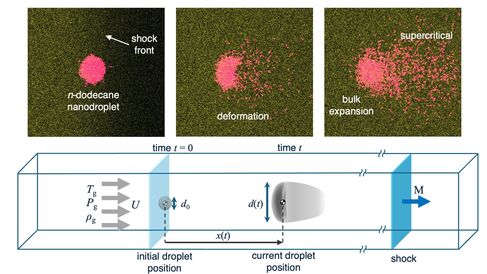Detonation and high-speed reacting flows

Detonation, or pressure-gain combustion, is a type of combustion where shock waves are coupled with chemical heat release. Detonation-based engines have no moving parts and a higher theoretical efficiency than flame-based engines, promising compact and efficient propulsion and power generation. However, controlling detonation for robust propulsion and power generation is challenging, because the underlying physics and chemistry are poorly understood.
In multiphase detonation, liquid or solid fuels (e.g. hydrocarbons, biofuels, dehydrated plant waste) are impacted by Mach 5 shock waves. The shock waves and high-speed flow behind them deposit momentum and energy to the fuel, leading to its rapid acceleration and vaporisation, while decomposition and oxidation reactions are occurring. This rapid energy transfer mechanism is characterised by non-equilibrium and supercritical behaviours, which couple with with drag, phase change and chemistry. Molecular simulations of the interaction of high-speed flows with droplets, particles and gas-liquid or gas-solid interfaces can be employed to understand the physics of rapid momentum and energy transfer and inspire analytical models for use in continuum simulations.
